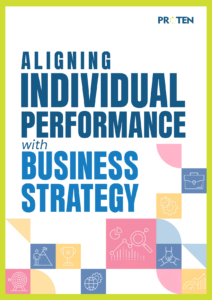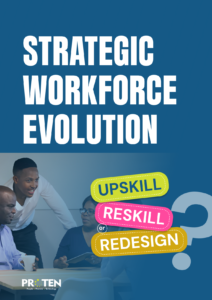What’s the difference between a manager people want to work for and one they can’t wait to leave?
The answer isn’t complicated. Great managers manage people well.
Here’s what most managers don’t realize: you’re already doing HR work. Every time you hire someone, give feedback or handle a team conflict, you’re making HR decisions. The question is whether you’re doing it well.
That’s why understanding the basics of HR for non-HR managers is important.
According to Gallup’s research, managers account for 70% of the difference in how engaged employees feel at work. Yet most managers get zero training on the people management side of their job, and that’s a problem.
In the workplace, you can’t separate managing work from managing people, and the best managers understand this. They think like HR professionals, even when it’s not their official role.
In this blog post, we’ll explain to you why HR skills matter for every manager, what you need to know, and how to build the confidence to lead people successfully.
The Case for HR Thinking in Every Management Role
The lines between leadership and HR are no longer separate, every manager today is, by default, a people manager.
HR thinking has evolved into a strategic pillar of business, influencing everything from team performance and employee engagement to retention and company culture.
For non-HR managers, “That’s HR’s job” is no longer an excuse. Whether you’re leading operations, sales, or tech, how you hire, develop, and support your team directly impacts business outcomes.
Poor employee decisions, whether it’s overlooking culture fit, delaying feedback, or mishandling conflict, can cost you your best talent and erode team morale.
Because thinking like HR isn’t just about knowing every policy, but it’s about understanding that people are your most important asset, and managing them well is your responsibility too.
How to Start Thinking and Acting Like an HR Leader
Ready to manage people like an HR? Here are the specific skills that separate good managers from great ones.
1. Master the stay interview, not just the exit interview: Don’t wait until someone quits to ask what’s wrong. Schedule regular one-on-ones focused on what keeps your best people engaged. Ask: “What would make you consider leaving?” and “What would make you stay longer?”
2. Learn to spot early warning signs: HR professionals are trained to notice patterns. Watch for changes in behavior: someone who used to speak up goes quiet, productivity drops without explanation, or a team member starts missing deadlines. These are signals, not coincidences.
3. Build feedback loops, not feedback bombs: Instead of saving all feedback for annual reviews, create systems for ongoing input. Weekly check-ins, project debriefs, and informal coaching conversations prevent problems from building up. This is part of performance management every manager should own.
4. Think like a talent scout: Great HR leaders are always thinking about development. Look at each team member and ask: “Where do they want to go next, and how can I help them get there?” People stay where they see a future, and that starts with workplace communication and mentorship.
Essential HR Skills Every Non-HR Manager Should Master
Now that you’re thinking like an HR leader, the next step is building the practical skills that bring that mindset to life.
You don’t need to become an HR expert, but you do need to master a core set of people skills that directly impact your team’s success:
1. Interviewing and Hiring the Right Talent: Beyond resumes and qualifications, know how to assess for culture fit, potential, and role alignment. Great hiring decisions prevent bigger problems down the line. Read more about how to build a skill-first hiring strategy here.
2. Onboarding and Employee Engagement: The employee experience starts on day one. Set the tone with structured onboarding, clear expectations, and early wins that drive long-term engagement. You can download our onboarding checklist.
3. Providing Effective Feedback and Managing Performance: Regular, honest feedback, both corrective and reinforcing, is key to growth. Learn to have performance conversations that are clear, fair, and actionable.
4. Handling Conflict and Difficult Conversations: Conflict is inevitable. What matters is how you navigate it. Equip yourself to address tensions early, stay objective, and preserve trust on your team.
5. Understanding Basic Labour Laws and Company Policies: You don’t need a law degree, but you do need to understand the basics, contracts, disciplinary procedures, and leave policies, to avoid costly missteps and support Management and HR collaboration.
How to Build HR Competence as a Non-HR Manager
Now that you understand the mindset and essential skills, the next step is building real competence, so you can confidently handle people-related responsibilities in your role.
Here’s how to start growing your HR capability without changing your job title:
1. Learn from your HR team: Treat them as strategic partners, not just policy enforcers. Ask questions, join relevant meetings, and understand the “why” behind HR decisions.
2. Leverage HR tools: Use existing resources like performance review templates, onboarding checklists, and feedback forms. These tools are designed to help you manage people more effectively and consistently.
3. Track simple HR metrics: Keep an eye on team turnover, engagement levels, feedback cycles, and absenteeism. These numbers tell a story about your team’s health and your leadership.
4. Read HR case studies and management books: Stay sharp by learning from real-world scenarios. Case studies offer insight into what works, what fails, and how to handle people issues strategically. You can read Proten’s whitepapers here to stay up to date.
HR competence doesn’t require a formal title, it requires curiosity, consistency, and a genuine interest in helping people thrive.
Ready to Lead People Like a Pro?
Managing people well is essential for any manager who wants to succeed. The skills we’ve covered aren’t complicated, but they do require practice and intention.
Start small. Pick one area where you want to improve, maybe it’s giving better feedback or handling conflict more effectively. Focus on that for a few weeks, then add another skill.
Remember, every interaction with your team is an opportunity to build trust, solve problems, or help someone grow. The managers who understand this don’t just get better results. They create workplaces where people actually want to stay.
Your team deserves a leader who can manage both the work and the people doing it. More importantly, you deserve the confidence that comes from knowing you can handle whatever people challenges come your way.
If you’re looking for structured training to accelerate your people management skills, check out Proten International’s HR for Non-HR Training.














